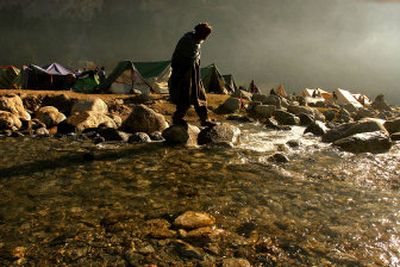Bitter rivals cooperating on quake relief

MUZAFFARABAD, Pakistan – In another sign of growing cooperation between South Asia’s nuclear rivals, India and Pakistan on Saturday proposed setting up aid camps along their disputed border in Kashmir, allowing earthquake victims to cross the frontier for medical treatment.
India suggested setting up three camps in the quake-hit zone of Kashmir that would provide food, drinking water and tents to Pakistani victims.
Pakistan made its own proposal hours later, suggesting five points along the disputed border for setting up aid camps and saying those visiting its portion of Kashmir would be allowed through immediately if they had proper travel documents, the Press Trust of India news agency reported.
Islamabad had reacted cautiously to New Delhi’s announcement, saying the two sides would have to meet to discuss the proposal, which followed calls from Pakistan’s president to open up the heavily militarized frontier for Kashmiris seeking relief.
Foreign Ministry spokesman Navtej Sarna said Pakistan’s proposals could likely be reconciled with India’s. He said earthquake victims would be allowed to cross the border for medical treatment, provisions and shelter in the three Indian camps, which would begin operating Tuesday pending approval from Pakistan.
Pakistan and India have fought two wars over Kashmir since independence 58 years ago. Both nations claim the region in its entirety. A slow-moving peace process between the neighbors led to the opening of a cross-border bus service earlier this year, but movement of Kashmiris is still heavily restricted.
Some 79,000 people are believed to have been killed in the quake, mostly in northwestern Pakistan and its portion of Kashmir. Nearly 1,400 people have died on the Indian side of Kashmir.
The United Nations has appealed for nations to give more aid, warning of another wave of deaths unless relief arrives for the more than 3 million people left homeless by the quake before the harsh Himalayan winter hits in less than a month.
World Bank chief Paul Wolfowitz said Saturday that the bank would step up its efforts to help Pakistan but stressed it was necessary to pinpoint what the needs were.
“The scale of the disaster is so enormous that, frankly, a big part of the effort has to go to figuring what the needs really are,” Wolfowitz told reporters in Helsinki, Finland.
World Bank spokesman Derek Warren told the Associated Press later Saturday that the bank has already decided to allocate a further $20 million in aid to Pakistan, raising its total commitment to $40 million.
Also Saturday, the U.S. Army sent its only mobile field hospital, the Germany-based Mobile Army Surgical Hospital, to Muzaffarabad, the capital of Pakistani Kashmir, where it would set up a 44-bed facility.